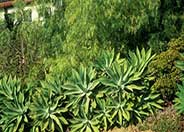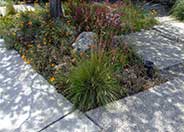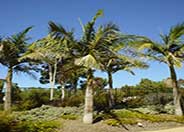
Common name:Fox Tail Agave, Velvet Agave
Botanical name:Agave attenuata
This Agave has a dramatic tropical form. Even light frost can damage its succulent leaves. It is great for containers. In the low desert, partial sun will be best. If it becomes top heavy, simply cut and stick in the ground to root. It is not a fast grower and has light green foliage. It will also die after flowering but pups around the mother will survive. Distinctive with its large rosette of leaves perched on a long curving trunk, it is a native from Mexico.

Common name:Smooth-edged Agave
Botanical name:Agave weberi
This is a striking medium-sized Agave that can grow to 5' tall by 6'-10' wide. This agave has very fine marginal teeth and is sometimes spineless. Supplemental summer watering can prevent yellowing from heat stress in the summer. These plants are also moderately cold hardy and tolerant of temperatures down to 12 degrees F. It is more refined looking than americana. It is native in central Eastern Mexico. It is one of the largest of the Agaves.

Common name:Kleinia
Botanical name:Senecio mandraliscae
This succulent perennial will grow to about 1.5' tall and 2' wide. It has curved, bluish gray leaves that are about 3.5" long and very slender.

Common name:Variegated Century Plant
Botanical name:Agave americana 'Variegata'
This Agave has a creamy yellow margins around the edge of the leaves. It will grow 6'-10' tall by up to 13' wide. It is native to Mexico. It has a very open growth habit, with leaves that recurve along their length.

Common name:Purple Hopseed Bush or Hop Bush
Botanical name:Dodonaea viscosa 'Purpurea'
This fast-growing shrub has an upright, branching habit that reaches a height of 12'-15', with willow-like leaves that are 4" in length. Its foliage is bronzy-green in color, which turns a reddish-purple shade in the fall and winter. It has compact growth and requires full sun for the best results.

Common name:Purple Tree Aeonium
Botanical name:Aeonium arboreum 'Zwartkop'
Aeonium arboreum 'Zwartkop' is a succulent perennial that is used for accenting effect. Aeonium arboreum grows 3' tall and wide. Each branch has a 6"-8 " wide rosette of dark green, fleshy leaves.The flowers are yellow in clusters.

Common name:Parasol Aeonium
Botanical name:Aeonium arboreum
Parasol Aeonium is an upright succulent with rosette leaf clusters. It forms a mound and can be easily propagated by cuttings.

Common name:Red Star Cordyline
Botanical name:Cordyline 'Red Star'
The 'Red Star' cultivar is an evergreen shrub that grows 12' to 30' tall and 10' to 15' wide with sword-like leaves with a reddish color. It likes full sun, and is very tolerant of heat and drought. It will live in any type of soil that is well drained. Cut back to develop multiple trunks.

Common name:Mueller's Fescue
Botanical name:Festuca muelleri
This Central European native fescue has shiny, dark green foliage that is slightly bluish green. It is a cool season grass that grows up to 8 inches tall and equally wide. If massed together it can become a lawn alternative.

Common name:King Palm
Botanical name:Archontophoenix cunninghamiana
This is a beautiful palm which grows 40' or higher with a 10'-15' spread. The feathery leaves can grow 10' in length and are green above and gray beneath. It tolerates shade and can grow beneath tall trees for a long time if needed. It 's unique because it can be used as an indoor plant and will tolerate temperatures down to 28 degrees F.
Designer: Brooke Dietrich
Photographer: GardenSoft
Incorporate compost 6" into your soil to retain water, reduce compaction, feed earthworms, and provide valuable nutrients to your plants.
Be sure to fix all leaks promptly no matter how small they may seem.
Remove irrigation water and fertilizer from areas where you don't want weeds to grow.